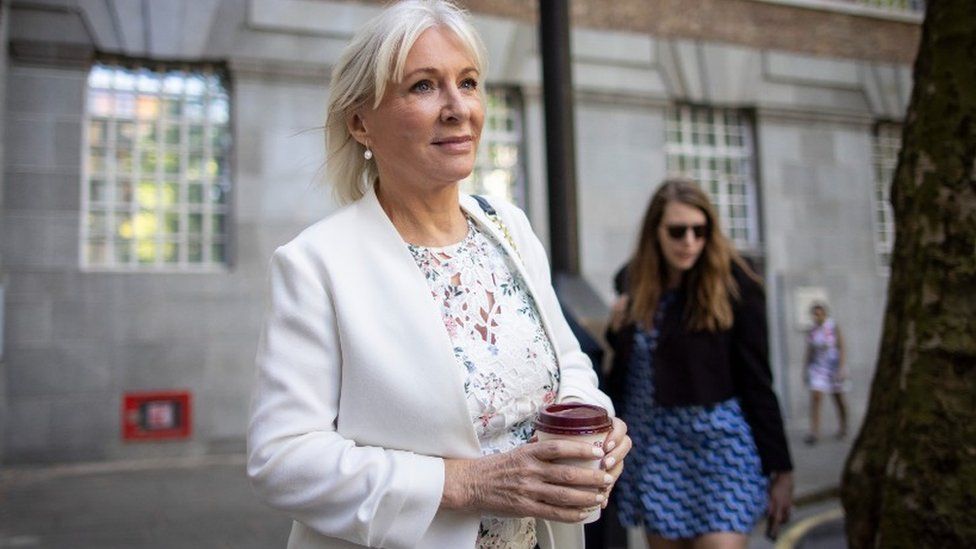ARTICLE AD BOX
 Image source, EPA
Image source, EPA
Nadine Dorries is pushing for Channel 4 to be privatised
Channel 4 has said an investigation has found no evidence to support claims by the culture secretary that parts of its show Tower Block of Commons were faked.
The 2010 series featured MPs, including Nadine Dorries, spending time living in UK tower blocks and council estates.
In May, Ms Dorries alleged that some people portrayed as living on her estate were actors and "were not real".
Channel 4 said on Friday that its investigation had not "revealed any evidence to support the allegations".
Two months ago, Ms Dorries told a House of Commons select committee that, after taking part in the documentary, she had "later discovered that they [the people on the estate] were actually actors".
She said: "The parents of some of the boys in that programme contacted me and came here to have lunch to tell me that the boys were in acting school. They were not really living in a flat - they were not real. They were actually actors."
In its statement on Friday, Channel 4 said it "takes any allegations of misrepresentation extremely seriously and always rigorously investigates any such claims".
The broadcaster asked Love Productions, which made the series, to look into the claims.
"The investigation, overseen by their external lawyers, encompassed contributors who were ordinary members of the public and with whom the secretary of state had significant interaction," Channel 4 said.
"It involved speaking with many of those involved in the making of the series, including contributors and crew, and retrieving and reviewing relevant documentation and footage, including 85 hours of raw footage filmed for the series."
Channel 4 then reviewed Love Productions' findings and undertook its own "internal document searches and review", it said.
"Neither Love Productions' investigation nor Channel 4's internal inquiries revealed any evidence to support the allegations made about the programme."
Ms Dorries has not responded to Channel 4's findings.
She was one of five MPs who agreed to spend a week on different estates while spending no more than £64.30 - a week's jobseekers' allowance at the time.
Julian Knight MP, chair of the digital, culture, media and sport select committee, said he had asked for her comments "as a matter of urgency".
'Future financial sustainability'
The affair comes as Ms Dorries is at loggerheads with Channel 4 executives over her plans to privatise the broadcaster, which its bosses argue would be damaging.
Channel 4 chief executive Alex Mahon told the select committee on Tuesday that Ms Dorries' government department had tried to rewrite a key part of the channel's annual report to downgrade its financial outlook, which may bolster the argument for privatisation.
She said the Department for Digital, Culture, Media and Sport (DCMS) had asked for changes to a statement in the report saying the company in its current form has a viable long-term financial future.
The department "made some comments that they would have preferred to see in the report, particularly about our future financial sustainability", she said.
"One of the questions that government has raised in its consultation is whether Channel 4 is financially sustainable. And I think it is right to say that we have a difference of opinion about that.
"I have seen no independent or otherwise evidence to show that we are not in a future financially sustainable position."
The government has argued that privatisation makes sense because TV advertising revenues are declining (along with traditional TV viewing) and programme budgets are rising, so Channel 4 is being held back from competing with other TV services.
The DCMS said the government, as Channel 4's owner, was "fully entitled to comment on the contents of its annual report", and that some of its language could have been interpreted as going against a commitment "to refrain from campaigning against privatisation".
The requested changes were not made, and the report was published in its original form on Friday.
It said Channel 4 enjoyed its "strongest ever financial performance" in 2021/22, with corporate revenues of more than £1bn for the first time and a record pre-tax surplus of £101m.
It also revealed that Ms Mahon's pay rose to £1.2m in the last financial year.
Channel 4 defended the rise, saying executive salaries were "benchmarked against, and broadly comparable to other commercial broadcasters in the UK", and that it recognised "Alex Mahon's leadership during a period of incredible creative and commercial success as well as significant uncertainty".

 2 years ago
86
2 years ago
86








 English (US)
English (US)